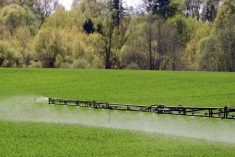An outbreak of avian influenza continued its spread this week with new cases reported in Canada and the United States.
Canadian officials reported the disease’s appearance Monday on a turkey farm near Woodstock, Ont. It was later confirmed to be the same deadly H5N2 strain that appeared in British Columbia in December and across several U.S. states in recent months, disrupting trade and challenging the flow of hatching eggs and breeders into Western Canada.
“The more outbreaks there are, the more strain it puts on human resources and so we’ve been working through that,” said Robin Horel, president of the Canadian Poultry and Egg Processors Council.
Read Also

Alberta crop conditions improve: report
Varied precipitation and warm temperatures were generally beneficial for crop development across Alberta during the week ended July 8, according to the latest provincial crop report released July 11.
“Currently, we have some states that we can’t trans-ship through at all, which is causing us some grief in Western Canada.”
More than 10,000 birds died on the Ontario farm, and eight other farms nearby have been quarantined to prevent the potential spread of the disease.
The Canadian Food Inspection Agency has reported that trade restrictions were placed on some Canadian poultry products by Hong Kong, Uruguay, Japan and Taiwan.
“It will, as it did in B.C., undoubtedly result in restrictions,” said Horel. “Some countries we know from history will restrict all of the entire country, which makes no sense, but that’s what they’ll do. Some will restrict a smaller zone. Some will restrict a province.… We have to make sure we’ve protected the poultry, for sure, from the disease, but then over and above that we’d like commerce to carry on if at all possible. The smaller the zone the better.”
Today, Horel said U.S. and EU officials had yet to announce any trade restrictions.
“The two-way trade is big with the U.S, the EU,” he said. “Some of the bigger ones are pending. Those will be the ones that are more important.”
In Minnesota, the appearance of H5N2 in a flock of 310,000 turkeys yesterday was the ninth in only a matter of weeks.
It’s one of several states Canada has restricted poultry imports from. The list also includes Montana, South Dakota, Kansas, Arkansas, Missouri, Minnesota, California, Idaho, Oregon and Washington, following cases in those jurisdictions.
The appearance of the disease in Arkansas last month drew concern from Canadian producers. The state is a key source of broiler hatching eggs and breeders.
Officials previously told The Western Producer that as many as 20 percent of the broiler hatching eggs in the country arrive from the U.S.
Horel said the control zone in Arkansas has been shrunk to two counties, allowing business to resume, but the restrictions on northern U.S. states are creating a logistical problem for western Canadian operations.
“Now the issue is trans-shipping,” he said. “You’re starting to get a bit of a roadblock there to try to get to Saskatchewan or Manitoba.”
He said products are being rerouted to come into Canada from Ontario or B.C. and transported to the prairie provinces.
The size of broiler hatching egg shipments would make flying them in probative, said Horel, but it could be an option for breeder supply.
“To my knowledge, and I think I would know if there were, there have been no supply interruptions,” said Horel. “We’ve been able to work our way through that, it’s just been a bit more of a logistics headache, that’s all.”
The U.S. Department of Agriculture believes migratory ducks are responsible for spreading this particular strain of the disease.
Contact dan.yates@producer.com
















